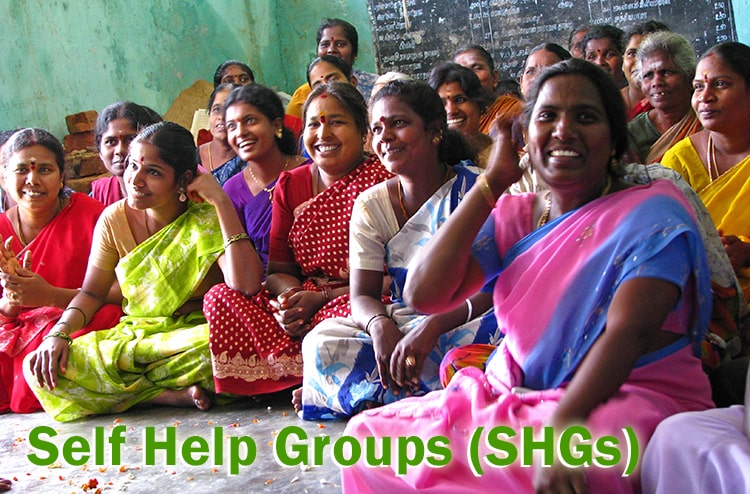The Millennium Development Goals were adopted at the millennium summit at United Nations in New York in the year 2000. This year, the goal to “Promote Gender Equality and Empower Women and To Ensure Environmental Sustainability “was introduced. In the Indian context, this goal was given predominance during the Tenth Five Year Plan (2002-07).

This goal aims at translating the national policy for empowerment into action with a three-fold strategy economic empowerment, social empowerment, and gender justice. In India, some Non-Governmental Organizations (NGOs) are working on the empowerment of women through SHGs. These Self Help Groups (SHGs) intends to develop a relationship between women’s empowerment and environmental management. It also ensures how women’s role in the promotion of environmental sustainability.
In general, the Self-Help Groups (SHGs) are informal associations of people who choose to come together to find ways to improve their living conditions. The people could be from a similar socio-economic background. SHG relies on the notion of “Self Help” to encourage self-employment and poverty alleviation. An SHG is made up of 15-20 members identified as poor or marginalized. For successful implementation of Self Help Groups, clarity and a common platform in the perception of all the stakeholders is required.
Need for Self Help Groups
- Self Help Groups provides minimal access to credit and financial services.
- The four major reasons for lack of financial inclusions as drafted by Dr. C. Rangarajan in his comprehensive report titled ‘Financial Inclusion in the Country’ are:
- Inability to provide collateral security,
- Poor credit absorption capacity,
- The inadequate reach of the institutions, and
- Weak community network.
- They help in poverty alleviation by providing credit facilities to the poor.
- They empower women by providing them social capital especially among the poor women.
- It promotes financial independence through self-employment by providing improved literacy levels and better health care.
- It encourages collective efforts for combating practices like dowry, alcoholism, etc.
- It promotes Gender Equality by providing ample opportunities for women to participate in turn increasing their self-esteem.
- It ensures Social Justice as most of the beneficiaries of government schemes have been from weaker and marginalized communities.
- It involves regular social audits hence improving the efficiency of government schemes by reducing corruption
- It helps the marginalized groups by providing them a source of employment by setting up micro-enterprises.
- It ensures a positive impact on Housing & Health as it leads to reduced child mortality, improved maternal health and the ability of the poor to combat disease through better nutrition, housing, and health – especially among women and children.
Also Read: The Concept of Green Schools
Limitations of Self Help Groups (SHGs)
- Many of the activities undertaken by the SHGs are still based on primitive skills related mostly to primary sector enterprises. Such activities often do not lead to any substantial increase in the income of group members.
- Lack of qualified resource personnel in the rural areas who could help in skill up-gradation or acquisition of new skills by group members.
- Lack of resources and means to market their goods.
- Heavy dependence on their promoter NGOs and government agencies. The withdrawal of support often leads to their collapse.
- Lack of knowledge and proper orientation among SHG-members to take up suitable and profitable livelihood options.
- Discouragement of women from participating in SHGs thus limiting their economic avenues.
- Lack of Security as the SHGs works on mutual trust and confidence of the members. The deposits of the SHGs are not secured or safe
Swarnajayanti Gram Swarozgar Yojana (SGSY)
For successful implementation and working of Self Help Groups (SHGs), the Government of India has introduced an effective Self-Employment programme ‘Swarnajayanti Gram Swarozgar Yojana’ (SGSY). It was launched in April 1999. This is a holistic programme covering all aspects of self-employment such as the organisation of the poor into Self-Help Groups, training, credit, technology, infrastructure, and marketing. SGSY will be funded by the center and the states in the ration of 75: 25.
The important stakeholders in the program are Gram Panchayat, Panchayat Samiti, BDO, DRDA, Banks, Line Departments and NGO. The SGSY is designed to incorporate the following three important approaches:
- Cluster Approach- This is the most important approach for the SHGs. It includes some basic key activities identified for each block-based. These activities are chosen on the basis of the available resources, occupational skills of the people and availability of markets. These key activities are chosen with the approval of the Panchayat Samitis at the block level and the DRDA/ Zilla Parishad (ZP) at the district level.
- Project Approach- For each key activity selected, a project approach is selected. Project reports are prepared in respect of identifies key activities. The banks and other financial institutions are closely associated and involved in preparing these project reports, so as to avoid delays in the sanctioning of loans and to ensure the adequacy of financing.
- Group Approach- SGSY also focuses on the Group approach which involves the organisation of the poor into Self Help Groups (SHGs) and their capacity building. Efforts are made to involve women members in each SHG. Besides, exclusive women groups continue to be formed. At the block level, at least half of the groups are exclusively women groups. SGSY particularly focuses on the vulnerable groups among the rural poor.
Also Read: Concept of Green Building and Benefits
Some of the predominant activities in various states under SHGs are listed below:
| State | District | Block | Activity |
| Gujarat | Ahmedabad | Dascroy | Meenakari & Oxodise work, Diary |
| Gujarat | Ahmedabad | Dholka | Dairy, Handicraft, Canteen |
| Gujarat | Jamnagar | Dhrol | Handicraft, |
| Gujarat | Jamnagar | Jamnagar | Handicraft, Silk Saree |
| Gujarat | Surendranagar | Muli | Patola, Handicraft, Canteen |
| Gujarat | Surendranagar | Wadhwan | Stitching Work |
| Gujarat | Vadodara | Vadodra | Pulse Mill, Tent house, Centering work, |
| Gujarat | Vadodara | Sankheda | Auto Garage, Fabrication, Centering work |
| Andhra Pradesh | Vishakhapatnam | S.Rayavaram | Toys, Fashion technology Sarees, Pickles, Powder & Papads |
| Andhra Pradesh | Vishakhapatnam | Yellamanchili | Etikoppaka toys, Pickles & Papads |
| Andhra Pradesh | Ananthpur | Raptadu | Food items, Handicrafts, Fabrics & Readymades |
| Andhra Pradesh | Ananthpur | Puttaparthy | Food items, Handicrafts, Beauty Parlour, Massage Centre |
| Andhra Pradesh | Medak | Sadasivpeta | Food items, Handicrafts, Handlooms |
| Andhra Pradesh | Medak | Sangareddy | Embroidery Saree, Food items |
| Andhra Pradesh | Nizamabad | Yellaready | Jewellary, toys, Leather work, Jute, Fabrics & Ready Mades |
| Andhra Pradesh | Nizamabad | Srikonda | Soft toys, Food items, Incense Sticks (Agarbatti), Tie & Die Saree |
| Bihar | Muzzaffarpur | Bandra | Small Irrigation, Dairy, Rural Artisen, Food Processing |
| Bihar | Muzzaffarpur | Kanti | Small Irrigation, Dairy,Poultry Farm, Bee keeping |
| Bihar | Gaya | Bodhgaya | Dairy, Small Irrigation, Poultry farm |
| Bihar | Gaya | Nagar | Incense Sticks (Agarbatti), Vegetables |
| Bihar | Madhubani | Benepatti | Mithila Painting, Dairy |
| Bihar | Madhubani | Rahika | Mithila Painting, Dairy, Fisheries, Small irrigation |
| Bihar | Seohar | Seohar | _______________ |
| Bihar | Seohar | Piprahi | _______________ |
| Uttar Pradesh | Rae Bareli | Rae Bareli | Saree, Dairy, Bamboo work |
| Uttar Pradesh | Rae Bareli | Salon | Tent house, Dairy |
| Uttar Pradesh | Mirzapur | Halia | Dairy, Dari & Kalin Work, Hand Pump Boaring |
| Uttar Pradesh | Mirzapur | Rahi | Dairy, Small irrigation |
| Uttar Pradesh | Ghaziabad | Hapur | Walker Sheet, Diary, Stitching, Furniture work |
| Uttar Pradesh | Ghaziabad | Loni | Bed Sheet, Different work, Handicraft. Hand pump Boaring |
| Uttar Pradesh | Jaunpur | Mariahu | Ressa Russi, Kalin & Dari |
| Uttar Pradesh | Jaunpur | Sahganj | Poultry farm, Dairy |
| Chhattisgarh | Raigarh | BaramKela | Bamboo work, Carpet work |
| Chhattisgarh | Raigarh | Dharamjaigarh | Small Business, Fisheries, Bamboo work, Goat husbandry |
Source: http://planningcommission.nic.in/reports/sereport/ser/ser_shg3006.pdf
Also Read: Environmental Health and Safety

She is a Conservation Biologist deeply concerned with the protection and sustainability of natural resources and wildlife. She is particularly interested in studying and addressing the loss of Biodiversity and educating the people about the same. She has a Master’s degree in Zoology with Post Graduate Diploma in Environment and Sustainable Development and another in Sustainability Sciences.
